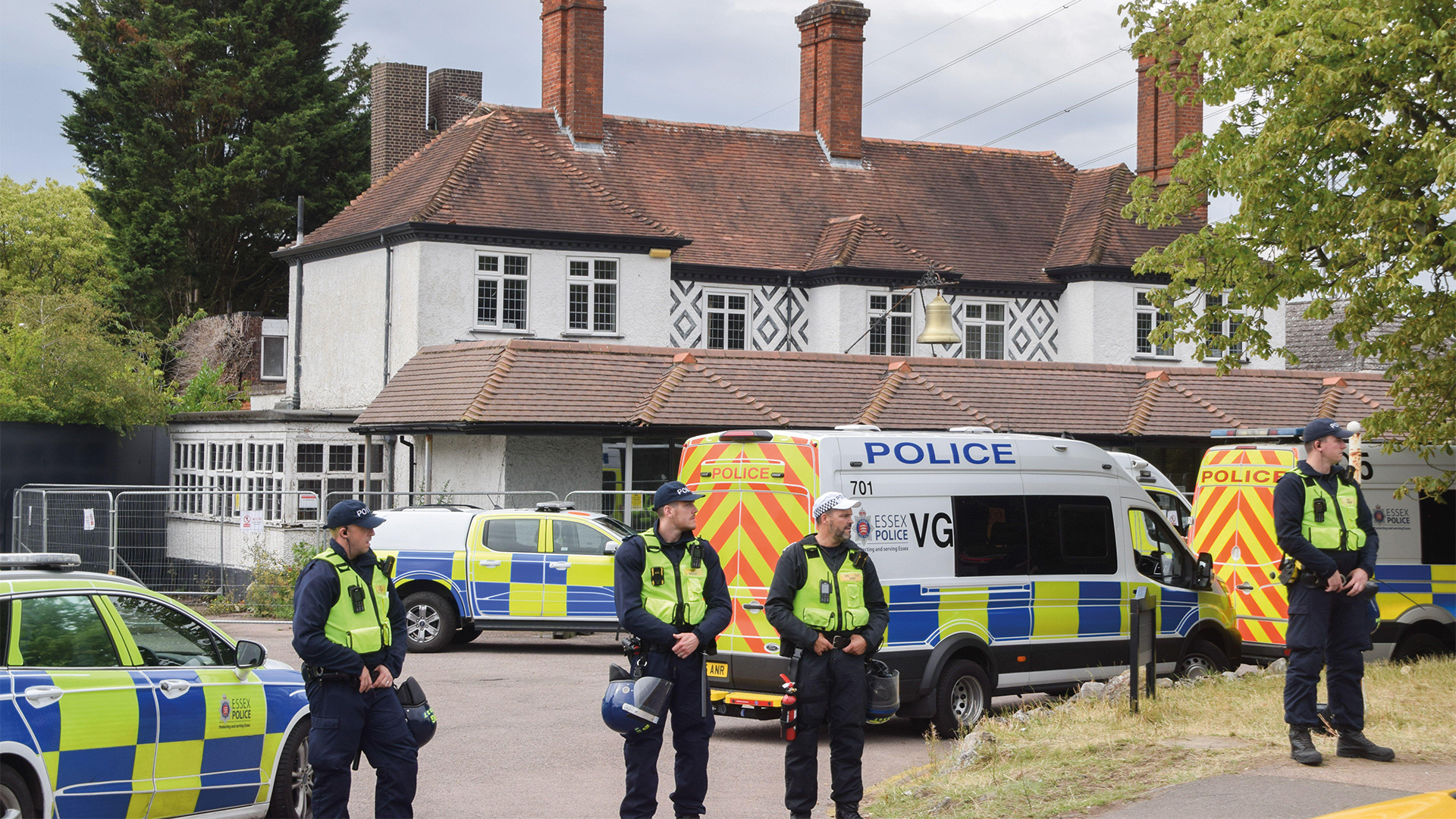As of June 2025, 32,059 asylum seekers were housed in hotels. Such stays are meant to be temporary – but a huge asylum backlog in the UK means asylum seekers are trapped in such facilities for months or years.
Meanwhile, they’re a lightning rod for far-right mobilisation: local protests have been co-opted by fascist groups like Homeland and Patriotic Alternative, reports show.
The government has pledged to close all asylum hotels by 2029. But last week, the High Court ordered the temporary removal of asylum seekers from The Bell Hotel in Epping, the first hotel to see protests this summer, after the local council launched a planning permission challenge. More councils will likely follow suit.
“We don’t have to wait until 2029 to end the use of asylum hotels – last week’s High Court ruling on The Bell Hotel in Epping has already proven this timeline is no longer viable,” said Solomon.
“A targeted, ‘one-off’ scheme focusing on cases from countries with high grant rates for asylum could end the use of hotels by 2026.”
Asylum seekers from Afghanistan, Eritrea, Iran, Sudan and Syria are statistically likely to have their claims approved. 86% of Eritreans, 98% of Sudanese and 61% of Iranians granted asylum at initial decision.
Advertising helps fund Big Issue’s mission to end poverty
Granting them limited permission to stay in communities could negate the use of hotels; as of the end of June 2025, four in ten people in asylum hotels were from those five countries.
However, some experts urge caution over whether the Refugee Council’s temporary residence proposal tackles the underlying problems.
“We haven’t tested or endorsed this specific idea of granting hotel residents temporary leave to remain,” said Amreen Qureshi, a research fellow with the Institute For Public Policy Research (IPPR). “But there is some logic in giving people more stability while claims are being processed. It could reduce hotel use. That said, unless the backlog itself is fixed, you risk shifting the bottleneck rather than solving it.”
“If you give people temporary status, they might then have the right to work, and that might mean they can rent houses in the private sector. But that doesn’t fix the core problem of dispersal housing, and could even create new complications if their asylum claims are later rejected.”
“Certainty of status, even if temporary, is better than being in limbo. But really, the real mission at hand – fixing our broken asylum system – won’t be fixed by short-term measures.”
She agrees, however, that hotels are unsuitable for people seeking asylum.
“Our research has shown that people do far better when they’re housed in communities. It supports integration from day one, reduces tensions, and is far more cost-effective,” she said. “Local authorities and communities need to be part of that solution. Safe community-based housing is better for well-being, cohesion, and the public purse rather than hotels.”
Muhammad, from Afghanistan, spent six months in an asylum hotel earlier this year and has now been granted asylum. Living in the hotel made him feel “like a target”, he said.
“People film residents outside the hotel without permission, using it in a negative way. It affects people and makes them feel hopeless about the system. One of my friends has been in a hotel for more than two years – he is very talented, but the uncertainty is a mental disaster,” he added.
Advertising helps fund Big Issue’s mission to end poverty
“Everyone knows about the risks in Afghanistan. People who worked for human rights, including rights for women and education for girls, risk losing their lives. People who worked with NATO or were members of the former army or air force are at very high risk, they are being killed in cold blood, and their families are also targeted.
“They should have their application processed as soon as possible so that they can use their talent and skills to work. This would avoid the deep mental crisis caused by spending a lot of time waiting.”
It would save the taxpayer money, too – in the financial year 2024/25, hotels cost, on average, six times more than other types of asylum accommodation.
“This situation is not business as usual,” said Solomon, “and it can’t be solved with business-as-usual thinking.”
The Refugee Council solution is markedly different to the proposals preferred by those on the right of politics.
On Tuesday (26 August), Nigel Farage announced plans to deport 600,000 asylum seekers, including women and children, if Reform UK win the next general election.
Advertising helps fund Big Issue’s mission to end poverty
Under the plan, named Operation Restoring Justice, people would be arrested on arrival and detained at disused RAF bases, costing about £10 billion over five years. They would then be sent back to countries where Farage acknowledged they might face torture or death.
Human rights experts slammed the plan as “inhumane” and “shocking”.
“It would amount to signing the death warrants of thousands of people,” said Daniel Sohege, director at Stand for All, whose pro-bono consultancy focuses on human, refugee and migrant rights.
Do you have a story to tell or opinions to share about this? Get in touch and tell us more.
It’s helping people with disabilities.
It’s creating safer living conditions for renters.
Advertising helps fund Big Issue’s mission to end poverty
It’s getting answers for the most vulnerable.
Big Issue brings you trustworthy journalism that drives real change.
If this article gave you something to think about, help us keep doing this work from £5 a month.





